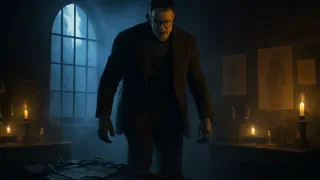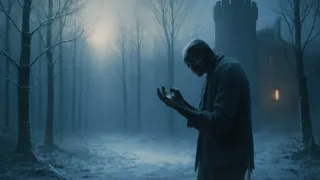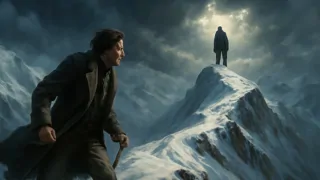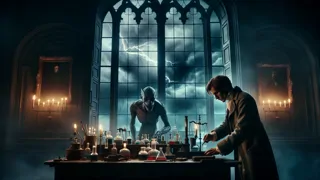Introduction
Nestled in the weathered walls of a secluded laboratory on the outskirts of Geneva, young Victor Frankenstein’s restless spirit drives him beyond the boundaries of accepted science. Fueled by feverish nights under flickering candlelight and the distant rumble of Alpine storms, he pieces together fragments of forbidden knowledge. Every jar filled with preserved specimens, every discarded limb, and each crackling arc of electricity becomes a brushstroke in his grand design. He keeps meticulous notes in leather-bound journals, mapping the human form in exquisite detail, but no ledger can record the weight of ambition. Beneath the fervor of his experiments, a whisper of dread coils around his thoughts as thunder rattles the shutters and cold winds seep through stone cracks. He senses that to bestow life upon inanimate matter carries a burden no mortal soul should bear. As the air inside his workshop grows thick with the scent of antiseptic and the echo of clashing instruments, Victor finds himself at a threshold that will redefine creation itself. Long before the Creature’s first heartbeat stirs, the seeds of triumph and tragedy are sown in the mind of its maker. In every spark that dances across the needle’s tip, Victor glimpses both the promise of immortal glory and the specter of irreversible consequence—a choice that will echo far beyond these lonely walls.
Genesis of Creation
Victor’s fascination with life began when his mother gifted him an anatomy volume at the age of thirteen. Each page of illustrations tormented him with the question of what lay beyond the motionless bone and inert organ. Years later, at the University of Ingolstadt, he channeled this obsession into painstaking research. He scoured dissecting rooms in dead of night, gathering fragments of cadaver and casting them into preserving fluids. Along dim corridors and under dripping lanterns, the boundaries between life and death blurred. By candlelit mornings, he sketched every sinew and vessel with obsessive precision, seeking the algebra of vitality. When he finally secured the thunderous power of electricity to animate clay and flesh, his pulse thundered in time with the storm outside.

In the grand hall of his private wing, Victor arranged his work beneath vaulted arches carved with angelic figures whose stone eyes seemed to judge his ambition. He connected sinew to wire, limb to limb, blood tubes to makeshift pumps. His breath hitched as the electrodes thrummed. Lightning crackled from metal rods into the pale canvas of the newly formed being. As life sparked, Victor staggered back, heart racing—exhilaration and horror clashing in his chest. The Creature’s eyelids fluttered open, revealing gold-flecked irises alive with raw confusion.
Neither triumphant nor triumphant alone, Victor recoiled. The creature’s first rasped breath echoed in his ears like a verdict. Shame and dread washed over him: he had woven creation from stolen fragments and stolen laws. In that silent communion, both creator and created understood that nothing could ever be untouched by the price of such an act.
The Creature’s Solitude
Shunned by its creator and exiled into the snowy wilderness, the Creature first tasted loneliness more bitter than any winter wind. Each breath in the ice-cracked forest billowed a ghost of sorrow. It stumbled upon abandoned cottages where flickering hearths and soft laughter reminded it of warmth it might never know. In frozen streams, it gazed at its own reflection—an assembly of mismatched parts framed by sorrowful eyes. Struggling to name its own nature, the Creature scavenged from the footprints of travelers, piecing together scraps of clothing and crusts of bread.

As days lengthened into weeks, it observed human families from afar, drinking in the language of compassion. It learned kindness in whispered lullabies floating on summer breezes and discovered anguish in sorrowful hymns sung at lonely graves. In each lesson, the Creature’s intellect outpaced its heart: it understood love but remained locked out of its embrace. With growing eloquence, it visited deserted halls and devoured books left behind—Paradise Lost, Plutarch’s Lives—each text chiseling new depths of longing into a soul unclaimed by any kin.
Hunger and heartbreak warred within the Creature’s mind: a desire for revenge flickered whenever rejection stung its wounds anew. Yet empathy held sway as it recalled small kindnesses from a blind elder who once offered a crust of bread. Torn between aching isolation and the luminous memory of human grace, the Creature vowed to confront its maker. In that vow lay the fragile thread leading back to Victor—an encounter that would unravel all illusions of control and demand a reckoning neither could escape.
Consequences of Creation
Victor returned to Geneva a hollow man, hope corroded by the Creature’s promise: �"I will be with you on your wedding night." He saw every friendly face as a judge, every celebration as a taunt. Wedding bells filled him with dread; every sacred vow felt like a countdown to slaughter. On the eve of his union with Elizabeth, he watched shadows twist beneath the sandstone arches of the cathedral, his prayers lost in the echoing vaults.

When the night grew thick with thunder, Victor raced through moonlit streets to the chapel. Inside, he found Damien—no, his bride—stretched lifeless upon the altar, stitched eyes fixed in final accusation. Horror clamped his chest as the Creature stepped from the gloom, silk coat damp with rain. In those hollow corridors, words of blame and despair roared into the night until no tongue could utter absolution.
Haunted by grief, Victor pursued the Creature across icy seas and broken ice floes into the Arctic wastes. There, on a ship trapped in frozen silence, he collapsed beside his vanquished creation—both driven by rebellion, both undone by regret. In his final moments, the scientist recognized that the pursuit of power without humility breeds nothing but ruin. With breath failing and frost upon his lashes, Victor understood: the greatest responsibility lies not in the spark that ignites life, but in the choice to honor the lives we shape. As he whispered words of forgiveness, he bequeathed his legacy to the very being he once created, closing the only chapter where hope and horror entwined.
Conclusion
In the remorseless glare of the Arctic dawn, Victor Frankenstein’s final testament revealed a profound truth: knowledge divorced from compassion transforms miracles into tragedies. The Creature, forged from ambition’s spark and abandoned to solitude, carried the weight of both creator and creation. It stood at the edge of the world, its ragged breath drifting in frost-laden air, bound by an understanding no human mind could gift another: that to bring life into existence is to accept eternal guardianship of its fate. In that silent expanse, father and son of one forbidden experiment parted with no reconciliation but with a shared burden: the memory of thunderous labors, of human longing, and of an irreversible deed that would haunt both species as long as memory endured. The legacy of Frankenstein lies not merely in a spark of life, but in the moral echo that outlives every storm—forever asking what it means to create, and who must bear the cost.


















